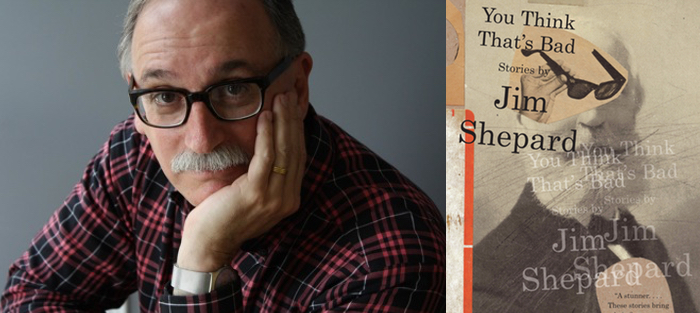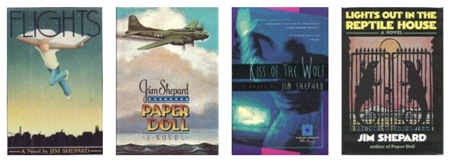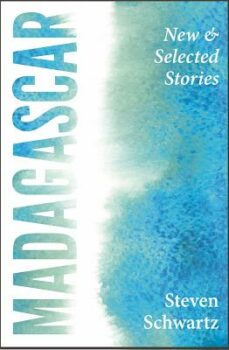Editor’s Note: As we approach our tenth year of publishing Fiction Writers Review, we’ve decided to curate a series of “From the Archives” posts that we’ll re-publish each week or so during 2017. Some of these features are editor favorites, some tie in with a new book out from an author whose worked we’ve covered in the past, and some are first conversations with debut authors who are now household names.
This week we’ve returned to Shawn Andrew Mitchell’s interview with Jim Shepard, which was originally published on March 7 of 2012. The two discussed Shepard’s 2011 collection, You Think That’s Bad. Shepard’s newest book of stories, The World to Come, was published by Knopf last week.
A secret affair on board a zeppelin. Three brothers involved in the Chernobyl incident. A Nazi expedition in search of the Yeti. It’s a rule: any discussion of Jim Shepard’s work must eventually turn toward the range of ground covered. In hyper-condensed story after hyper-condensed story, he pushes through new subject matter that could easily have taken a whole novel to explore, and when you’ve read enough of his stories, you start to wonder if there are boundaries to his empathy. They must be somewhere, because we’ve all got them, but they certainly don’t seem to involve gender, class, nationality, sexual orientation, time, or space. Maybe it’s the human-animal divide? No, he wrote from the point of view of the swamp monster. Maybe it’s the fourth dimension? I can’t remember anything about string theory in his oeuvre. But, then, he’s still going.
Those familiar with Shepard’s past work will recognize this trend in his latest collection, You Think That’s Bad (Knopf, 2011), which could almost be read as an exercise in one-ups-manship—he invokes the voice of a “Black World” ops man embroiled in a touchy conversation with his wife and friend, an engineer made helpless in the face of a crumbling marriage and the rising sea level in the Netherlands, and even a servant of Gilles de Rais, the Breton knight and fellow of Joan of Arc accused of the serial killing of children. His narrators are thrown up against even more dire circumstances than previously, and while Shepard continues to take the careful time to feel for their predicaments, he also continues to spare them no sorrow (in a good kind of way).
Like a lot of my fellow MFA students and friends, I came across Jim Shepard’s work only a few years ago. I’d stumbled across a copy of Love and Hydrogen (Vintage, 2004) in the Staff Recommends section at McNally Jackson booksellers in Soho, and was immediately grabbed by the title story regarding two gay men aboard a zeppelin. But Shepard has been at this long before those National Book Award Finalist and Story Prize winner stickers were slapped on the cover of Like You’d Understand Anyway (Knopf, 2008). He’s the author of six novels and four story collections, and the editor of several anthologies. His fiction has appeared in Harper’s, McSweeney’s, The Paris Review, The Atlantic, Esquire, Playboy, The New Yorker, and everywhere else, and he was a columnist on film for The Believer. His stories have appeared four times in the Best American Short Stories and once in the Pushcart series. Additionally, he teaches at Williams College and is a husband, a father, and the caretaker of several beagles.
Despite all that he was kind enough to take time to talk with me, a fan-boy and MFA candidate. Via e-mail and phone we got a chance to discuss his early career, his process, where he might take his narrators next, and how he feels his mustache measures up to Tobias Woolf’s.
Interview
Shawn Andrew Mitchell: In your essay “An Appreciation of John Hawkes,” up over at The Rumpus, you discussed your mentorship under Hawkes during your time as an MFA candidate at Brown University. Had you done much writing before this? If it existed, what was Jim Shepard juvenilia like?
Jim Shepard: By that point I’d written my whole life, as short as it was. I’d always written, for myself, and occasionally for the nuns at Our Lady of Peace School, when I’d finished all of my English in-class assignments early. I wrote mostly about war and monsters. I remember Sister Justine being bemused at one story of mine entitled “Save That Blood!” I think it involved G.I.’s fighting werewolves. As you can see, I haven’t come very far in terms of subjects.
What sort of things did you read at that time?
Nobody in my family went to college, so I only read what books my parents had in the house, which were almost entirely nonfiction. What that meant was that because nobody had taught them about literature or encouraged them to read literature, they thought “Well, of course you want to read because you want to be an intelligent human being, but if you’re going to read you want to learn stuff, and the way you learn stuff is you read nonfiction.” So I grew up reading all about volcanoes and dinosaurs in little science or history books for kids. Every so often I read a sort of summarized version of Viking myths or Greek Myths. I didn’t really know about the world of children’s books until I got to college and people would say, “I love Where the Wild Things Are,” and I would say, “What’s that?”
Do you still go back and read about mythology?
Not really, no. I’ve read Italian Folktales, by Italo Calvino, and stuff like that, but I don’t do that kind of folkloric wandering very often. I wouldn’t pick it up as a kind of curiosity. Normally there are so many other things I’ve got to get to that I don’t think, “You know, I don’t know any South Seas myths, I think I’ll read some of those.”
If the internet is to be trusted, you graduated from Brown in 1980 and your first book, the novel Flights, came out in 1983. What were you up to during those three years, creatively and professionally? I ask partially because I’m about to exit my MFA program, and there seems to be a yawning void ahead.
I got a job right out of Brown, at the last minute, teaching at the University of Michigan. I was finishing the final year of my MFA and facing the void you describe when Michigan asked Brown for the names of two or three students they might invite to apply to teach. I agreed to the interview because it meant a free trip to New York; I never really imagined they’d offer me the job. Then when Michigan did, I accepted, since I had no other prospects. The hubris of what I was doing never really hit me until I arrived in Ann Arbor. I spent the next three years working eighteen hours a day to keep up with what I had agreed to teach. (As in, “Hey: I’m lecturing on Lolita on Thursday. Oh, shit.”) During the summers, I tried to prepare for the upcoming fall semesters, and worked on Flights.
Flights was followed by three more novels: Paper Doll (1987), Lights out in the Reptile House (1990), and Kiss of the Wolf (1994). Then, in 1996, Knopf published your first collection, Batting Against Castro. Were you working on short stories concurrently with the novels, or did you break from those entirely until you began work on Batting?
I wrote stories as an undergraduate and a graduate student, so a number of stories that are in Batting Against Castro are quite old. Some of them are older than my first novel. There’s a story in there called “Eustace,” which was the first story I published. There’s also a story called “Messiah,” which was probably the first decent story I wrote after a whole lot of bad stories. So Batting Against Castro, unlike a lot of the other story collections, really took about fifteen or twenty years to come together. It’s probably my weakest story collection if I had to judge, mostly because I think I’ve gotten better as a story writer. But whereas You Think That’s Bad took two and a half years, Batting probably took twenty. Mostly because I was writing novels along the way.
Along with the teaching load.
Along with the teaching and having children and bothering the dog and stuff like that.
Do you find it hard to switch between working on short stories and working on a novel? I’m having to work on stories for workshop right now, but I’m focusing on a novel for my thesis. It’s a tough balancing act.
No, I think what the stories were doing was allowing me to write when I didn’t have a novel idea or when the novel idea that I had didn’t seem to be working. So I didn’t really feel like I was switching. I felt like I was saying, “Well, since you don’t have a novel, why don’t you try to do something?” Or I might have come across an idea that I thought was cool but I knew wouldn’t be a novel. So it didn’t feel much like switching. It felt like trying to keep myself working in some capacity.
What sort of ideas do you feel could shape into a novel and which ones do you know are going to be short storyish?
It’s hard to say, really. Certainly some of the longer stories I’ve written lately have had a huge amount of narrative that could have been developed and a huge amount of research that went into them. A lot of my writer friends have said, “You’re crazy for not making this a 500-page novel.” So it’s not exactly inherent in the narrative itself. It has a lot more to do with how long I want to maintain the obsessive intensity of staring into that world. I think as I’ve gotten darker in terms of subject matter, the desire to stay in that world has diminished as well. If you’re writing about the servant of a mass murderer, the energy involved in trying to stay empathetic is such that five months is probably enough and three years might be too much.
Why do you think your subject matter has gotten darker as you’ve gone along?
I don’t know, but I think in general my sense of the world is becoming more apocalyptic. The despairing or angry sense you have that things are going down the toilet, which I suppose is a characteristic of getting old and crotchety, is a little bit exaggerated by a situation whereby you can almost confirm that sense just by empirical standards or even just by watching the news. It was always the case when I was growing up that people would say “America’s not what it used to be; the world’s going to hell.” It seemed back then that it was pretty easy to claim that was a controversial position. Now I don’t think it is. I guess I have a sense of powerlessness in the face of that. Very few people are in any position to stop it, but writing literature is a particularly good way to feel like you have no impact on the culture.
Was there a time when you felt that fiction could influence the culture in a positive way?
I recently visited Notre Dame. And some faculty there told me that on the day that Martin Luther King was shot in 1968, all of the major news services were frantically calling South Bend because apparently Joseph Heller, Norman Mailer, Ralph Ellison, Kurt Vonnegut, and Wright Morris were all there for the literary conference, and the national media urgently needed some American fiction writers’ responses to what had happened. The assumption was—as it still is in Europe—that literary fiction writers, having engaged with some care the social issues of the day, had something to contribute to the national conversation. Try to imagine something like that today.
That’s uplifting to think about… Maybe we should switch topics to something jollier like “craft.” How about research? At what point in the process does your research begin to coalesce into fiction? Does the research continue into the drafting time, or do you get it done beforehand?
I do a lot of reading of weird shit just because I like to, and some of that never coalesces into anything. At some point, though, sometimes various human dilemmas I’ve come across in my reading start to haunt me—resonate with some of my own emotional history—and at that point I might start researching more pointedly. Research continues all the way through the writing process, and even the final revisions.
Speaking of, McSweeney’s sent you to the Netherlands for a few weeks to do research for “The Netherlands Lives with Water, one of the short stories included in You Think That’s Bad. How did your process differ for that story vs. stories where your research typically involves more reading than travel?
It didn’t, really. Being in the Netherlands led me to other sources of information—taught me about other sources of information—the same way books would have. Maybe I developed a more visceral sense of Rotterdam from being there for as long as I was; I don’t know.
Have you done a lot of traveling in your life otherwise?
I never traveled at all until after I got my first decent-paying job, at the aforementioned University of Michigan. Since then I’ve gone to Europe a lot, and around the US. And the Caribbean. That’s about it.
Do those trips spur an interest in writing stories set there at all? Or does that still come mostly via your off-the-wall reading?
With some stories a trip is certainly a help. It would help if you’re writing a story about an executioner in Paris if you had actually been in Paris and wandered the streets. But for the most part these are research and imagination-based stories. I’ve written about Tibet and never been to Tibet. I’ve written about Australia and never been in Australia. I’ve written about Japan and never been in Japan. I don’t feel the impulse to have to be there. There have been times when I thought I should make the trip but the cost and rigmarole were such that I thought, “You’re better off writing than going through all that energy.”
Have you ever tried your hand at more straightforward nonfiction or journalism instead of stories?
I’ve done essay writing on politics and film. I haven’t been that interested in journalism because I think other people can do it as well as I can if not better, and nobody’s offering. Nobody’s saying “Jim, do you want go study this or study that?” I also don’t know if there’s that many outlets for it. If I said, “Gee, would you pay me to go on site at Fukushima and report on the reactor breakdown?”, I think most nonfiction or journalism outlets would go, “Well, you’re a fiction writer, what do we get out of that?” So then it becomes a question of if I want to do all of that on spec or put in all of that money up front and write this piece and hope somebody somewhere runs it. And I’m not sure there’s too many things, facing limitations like that, where I think, “If I don’t do it, no one will.” I also understand why, if I were a newspaper or magazine editor, I might say, “I’d rather have a physicist who can write travel to Fukushima rather than send a fiction writer to chat with physicists.”
 It seems that a large majority of your stories are in first-person. Has it always been that way? What draws you to that point of view more than others?
It seems that a large majority of your stories are in first-person. Has it always been that way? What draws you to that point of view more than others?
My first three novels were in the close third-person, which seemed to me much more flexible. Lately, though, I’ve been attracted to the perversity of highlighting the chutzpah involved in some of my choices of narrators. Maybe it raises the stakes for me.
Related to that, it’s often struck me while reading your stories that what might be even harder than crafting a story around so much factual research is getting the human tone right for that time and place. Do you think about this while you work? How much do you change your tone and style for each story?
I think about that a lot, because that’s really what’s on the page. In a lot of ways, if I’m writing a story about Tsuburaya, the Japanese special effects wizard, it’s really more important that I get his voice right than if I get the Japanese details right, at least at first. And the two are not very separable. So I’m much more interested in trying to nail that down, especially now that I’m doing more first-person stories than third-person stories. Although that story is in third-person, there’s still a quality where you want to provide the illusion of a very different sensibility, but a sensibility that is still apprehensible to the American reader. So that’s really a matter of very careful moderation of tone. Tone is partly based on concrete details, but also on how that voice presents information.
So a lot of energy goes into that at a very early stage. Do I have what seems to me persuasively strange in the way I want it to be strange? Do these sound like Poles even though I’ve not spent a lot of time around Polish people? Do these sound like Japanese people even though I’ve not spent a lot of time around Japanese people?
It seems like it could become a question of nature vs. nurture, as in how much is specific to a culture and how much you can just assume is a kind of cultural universal in regards to “human nature.”
Right. There’s a slight of hand there because literature is supposed to be universal, but you also believe that you’re learning very specific cultural eccentricities. So you can relate to Tsuburaya because he’s a human being too, but you also feel sometimes reading him “God, that’s so Japanese,” and you’re not even sure what you mean by that in some ways. What you mean is a combination of insight and stereotype and any number of other things.
But stereotype is just a kind of brutish way of gathering together empirical data and insights about a particular group. So you say Italians tend to be warmer than Germans or Germans tend to be more organized than Italians, and of course those are generalities and stereotypes, but the Italians and Germans would also be the first ones to tell you, “Yeah, that’s sort of true.” So you’re trying in some way to interrogate the stereotypes and explode the stereotypes even as you make use of them.
There’s a subtle difference between stereotype and archetype, maybe?
Yeah, that’s a part of it. Archetype I try to avoid because it has so much of a Jungian grandiosity to it. I think of archetype not so much as German as The King or The Son or something like that.
What is it about the chutzpah-filled and somewhat self-deceiving character that attracts you?
I like the tension that comes when somebody who is quite self-conscious and quite smart still doesn’t seem to get it about himself or herself. I like the way that highlights and muddles those issues of responsibility and agency. I think a story where someone simply doesn’t know any better and so he does something wrong is a much simpler story, because that seems to suggest that if you just gave them the right information, that would solve the problem. I don’t think a lot of human behavior that’s very interesting operates that way. I think there’s a lot of examples where the person knows what he or she should be doing, tries to do it, and fails, and that’s very interesting.
You’ve talked in other interviews about how writers need to broaden their empathetic range, aka how deeply they can feel about how broad a swath of the world’s people. Do you have any advice as to how we might go about this? What do you encourage writers to do to develop it?
The usual: read more, and read more widely. Observe more carefully. What’s that great Walker Evans line? “Die knowing something. You’re not here long.”
You’ve also lectured that the writer should provide operating instructions for the reader to be able to navigate the story. What kind of instructions?
Each story creates its own special set of expectations, I think, and I’m always grateful when a design that I thought I’d begun to discern is confirmed, gracefully, by the story itself. What we don’t need is to be told stuff we already know, or have intuited.
What sort of things do you find your students telling the reader over and over again? What do they often leave out that seems essential?
It really depends on the model they’re trying to build. But when you’re trying different things, you want to reassure the reader that the weird thing they’ve started to notice, you meant that to be there. There are all sorts of way to reassure the reader of that kind of thing, but I’ll give you an example. You might have a person wander onto stage and start saying stereotypical things about Chinese people, and the reader reading that goes, “Is that the story’s agenda?” But as soon as a secondary character says, “You realize you sound like an idiot, right?”, the reader has a great sigh of relief and says, “Oh, OK, this story knows that it’s doing that.” That’s a really simple way that operating instructions might work. You basically say, “I know you thought it sounded weird, but in fact, I know that too,” and the reader suddenly feels a lot more confident in the design as you go along.
It’s that moment in Ulysses where you go, “Oh, this isn’t a guy who doesn’t understand punctuation. This is being done for a reason and paying off, and there’s a consistency to it.”
Another element of your teaching is that the writer should control the “rate of revelation” in the story, or how fast how many things are revealed as the story progresses. For the sake of facts and numbers, what’s the ideal rate of revelation in terms of revelations per page (r.p.p.)? How much character, conflict, background, and factual data can the reader digest at a time?
Ha! How do you measure such a thing? I suppose I’d say that everything in a short story should be accomplishing multiple tasks at once, in terms of informing the reader, and that everything should be continually enlarging, as opposed to confirming, our understanding.
Going back to the weird shit you read, what have you gotten into recently?
To give you a sense of how weird my shit can get, lately I’ve been reading about 17th and 18th century farming in America. If you want to talk about a subject where people think, “Why on Earth would you do that?” That’s the kind of weird stuff that I’ll just get into and start nosing around and not even be sure why. I don’t know how long it lasts. I do know that the good news is that if I do it for awhile and think, “Alright, I’ve done enough of that,” I don’t beat myself up over it and go, “What was the point?” Because I do think it’s interesting while I’m doing it and it’s in some way enlarging my concept of the world.
Are you working on another novel now, or do you plan to continue blowing up the short story form? What are we going to see next?
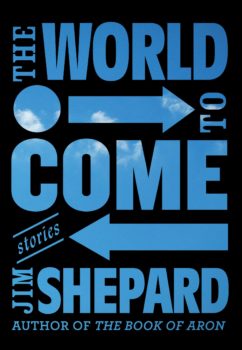 I have only the most tentative plans for a novel at this point, so I’d expect more stories. Bad news for anyone who depends on me in economic terms.
I have only the most tentative plans for a novel at this point, so I’d expect more stories. Bad news for anyone who depends on me in economic terms.
You’ve been at this now for quite some time. What have you noticed in those who keep at it versus those who don’t?
Quite some time? Jeez. Now I’m depressed. If it’s not too circular in terms of reasoning, I think I’d suggest that the main thing those who’ve kept at it have going for them has not been talent but the willingness or the determination to persevere. Not only in the face of rejection from the outside world, but also in the face of their own disappointments with themselves.
Maybe we should end this on a lighter note than our deep, deep disappointment in ourselves. My friend wanted me to ask you about your mustache, specifically how you feel yours measures up to Tobias Woolf’s.
Oh, man: it’s not even close. Toby’s mustache is epic. He could star in a western series for HBO. I look like the skeevy guy with the unmarked van.

